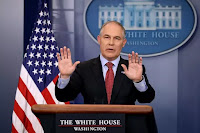“EPA originalism” couldn’t be further from the agency’s original mission.
Over at Politico, Alex Guillén has a nice story on “EPA originalism,” the alleged principle that Scott Pruitt, administrator of the Environmental Protection Agency, is using to justify massive budget cuts and regulatory rollbacks at the agency. The headline calls the principle “radical.”
Pruitt coined the term in an interview with Breitbart back in March, when he pledged to “re-focus the agency toward Congress’s original authorities.” It’s part of his much-touted “Back to Basics” approach.
The approach is being warmly received by conservative media, of course, but make no mistake: “EPA originalism” is nonsense.
In spirit, it is diametrically opposed to the intent of the lawmakers who passed the laws that EPA now enforces. They meant those laws, and the agency, to grow and evolve.
In practice, it means rolling back rules that took years of work to develop and reducing the agency’s capacity for science, research, and enforcement. By doing this, Pruitt is not returning EPA to anything. He is rejecting its mandate, creating something radically new and diminished.
He will find himself restricted in how much of this devolution he can accomplish. EPA rules are quite resilient, as is the agency’s budget. But whatever his ultimate effect, no one should pretend that he’s acting in the spirit of EPA’s founders. The Politico headline calls the idea “radical,” but really it’s just wrong.
America’s foundational environmental laws were designed to evolve
To understand the key dynamic at work in US environmental politics, it’s worth revisiting a 2010 journal article called Beyond Gridlock: Green Drift in American Environmental Policymaking, by political scientists Christopher McGrory Klyza and David Sousa.
Between 1964 and 1980, the “Golden Age” of environmental policymaking, 22 major federal environmental bills were passed and signed into law, including the Clean Air Act, the Clean Water Act, the Endangered Species Act, the National Environmental Policy Act, and many more.
Since then, aside from the 1990 Clean Air Act amendments, there has been almost total legislative gridlock. Rising polarization has rendered Congress impotent on major environmental challenges.
And yet, US environmental law and regulation have stumbled forward over the years, rarely backward. Why? Answering that fully is complicated, but at root, as Klyza and Sousa write, it is because those visionary laws passed in the ’60s and ’70s were designed to evolve.
They were written broadly, instructing executive branch agencies to pass, in effect, whatever regulations were necessary to protect public health. They mandated regular scientific reviews, to keep agencies appraised of the latest threats. Most of them instructed agencies to pass regulations based on public health criteria, not on lowest-cost economic grounds.
The Clean Air Act has been updated as the science has improved
Take the Clean Air Act. In Section 108, it specifies that air quality standards are meant to protect the public from “air pollution which may reasonably be anticipated to endanger public health or welfare.” That is quite vague, and deliberately so. It was understood by lawmakers that science evolves and so regulations should evolve too, updating alongside our best scientific understanding.
That is the purpose of the regular scientific reviews mandated by the law. And it is how the Obama administration was able to able to issue the Clean Power Plant rule, aimed at reducing carbon dioxide emissions from existing power plants 32 percent below 2005 levels.
When Pruitt “maintains that the agency’s Obama-era leaders vastly overstepped EPA’s authority by issuing regulations such as its greenhouse gas limits for power plants,” as Guillén writes, he is simply incorrect as a matter of law.
The legal question is whether greenhouse gases qualify as a “pollutant” under the Clean Air Act. The Supreme Court decided that question, in 2007’s Mass. v. EPA. It said, yes: If EPA determines that they threaten public health, it can regulate greenhouse gases. In its 2009 endangerment finding, EPA determined that, yes, greenhouse gases threaten public health.
So EPA is now bound by law to regulate greenhouse gases. Unless Pruitt can overturn the SCOTUS decision (he can’t — the law isn’t on his side) or the endangerment finding (he can’t — the science isn’t on his side), he must regulate.
Read more at EPA Administrator Scott Pruitt’s New Slogan Is Nonsense

No comments:
Post a Comment